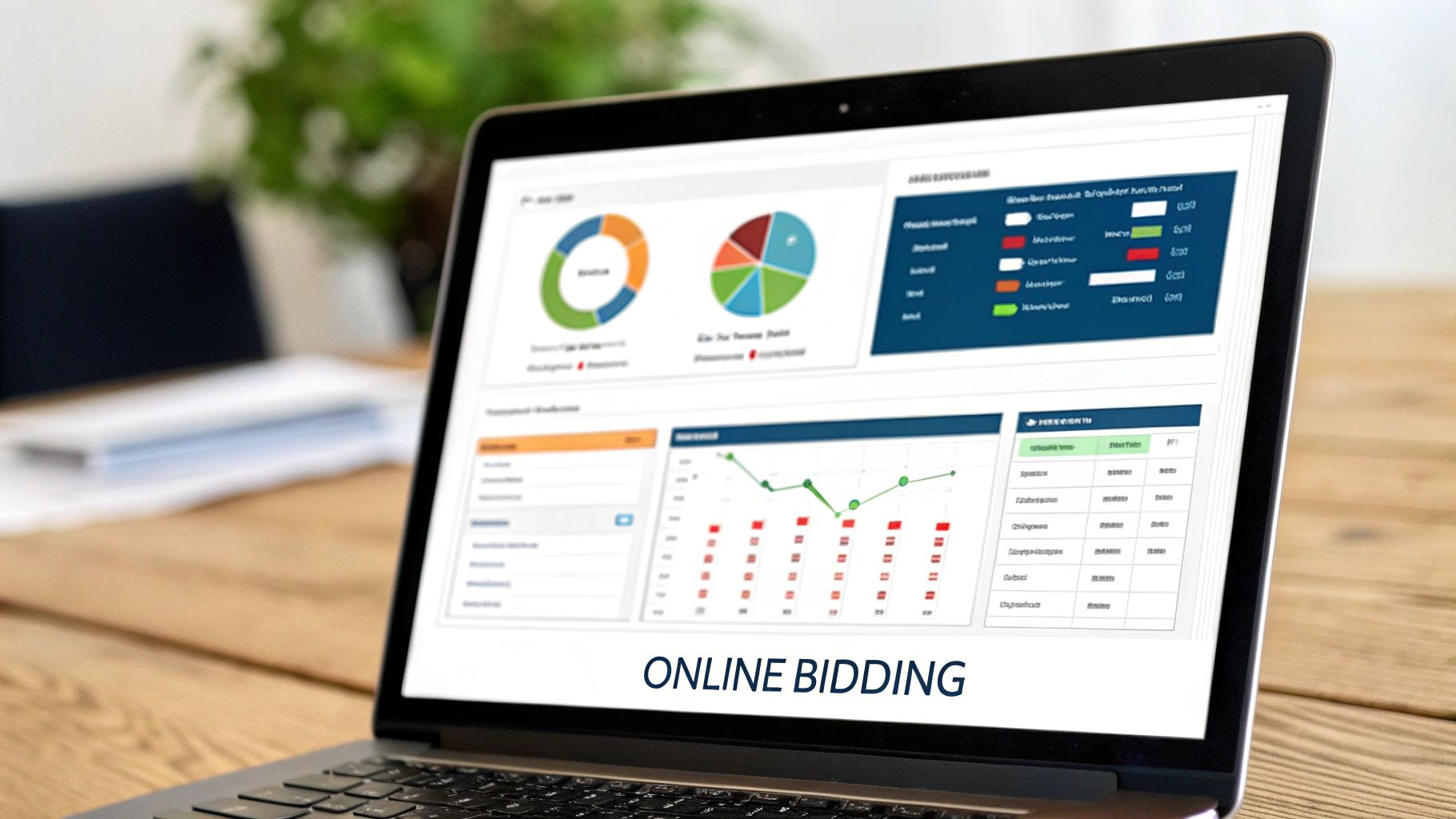Before you even think about bidding on a single job, you need to get your house in order. Landing those big commercial cleaning contracts isn't just about being good with a mop and bucket; it's about looking and acting like a serious, professional operation from day one.
Clients are entrusting you with their spaces—their offices, their medical clinics, their brand's image. They need to see a reliable partner, not just a cleaning crew. Let's walk through how to build that solid foundation.
Build a Rock-Solid Foundation to Win More Contracts
Think of these first steps as the non-negotiables. Getting this right from the start is what separates the amateurs from the pros who consistently land the high-value contracts.
Look the Part: Credibility is Everything
First things first, you need to be legitimate. This isn't just about ticking boxes; it's about building immediate trust with potential clients.
- Get Licensed and Insured: Make sure you have all the business licences required in your area. But the real deal-breaker for most commercial clients is insurance. You absolutely need general liability insurance and a janitorial bond. Honestly, many businesses won't even look at a quote from a company that isn't properly insured. It’s your safety net and theirs.
- Create a Professional Brand: Your brand is more than just a snappy name and logo. It's how you present yourself to the world. Think professional business cards, a clean and simple website showcasing your services, and even branded uniforms for your team.
Don't Be a Jack-of-All-Trades: Find Your Niche
It’s tempting to say you’ll clean anything for anyone, but that’s a rookie mistake. The real money is in specializing. When you have a niche, you become the go-to expert for a specific type of client.
For example, if you specialize in cleaning medical offices, you’ll know the ins and outs of proper sterilization. If you focus on post-construction clean-up, you'll have the right equipment and know-how to deal with drywall dust and debris that a general cleaner wouldn't.
Here are a few profitable niches to consider:
- Medical and dental clinics
- Post-construction sites
- Eco-friendly "green" cleaning for modern offices
- Restaurants and commercial kitchens
When you pick a specialty, your marketing becomes laser-focused. You know exactly who you're talking to and what their pain points are. This makes you stand out and gives you a massive edge over the competition.
Generating a Consistent Flow of Cleaning Leads
Once you've got your business fundamentals dialled in, the real work begins: creating a steady, predictable stream of new opportunities. If you're just relying on word-of-mouth, you're probably all too familiar with the feast-or-famine cycle that can bring your growth to a screeching halt. The secret to breaking free is building a multi-channel strategy that keeps your pipeline full.
This means looking beyond just picking up the phone and cold calling. To really get a consistent flow of potential clients, you need a mix of proven lead generation solutions that combines modern digital outreach with old-school, real-world networking. This way, you’re showing up wherever your ideal clients are looking for services like yours.
For example, I've seen companies have huge success by strategically using LinkedIn. It's a goldmine for connecting directly with facility managers or property owners in your target niche, letting you build a bit of rapport before you ever even think about pitching your services.
But before you jump into any specific tactic, it all starts with solid market research. You have to know where to aim your efforts.

Digging into the data helps you find those high-demand niches and lets you fine-tune your messaging so it actually lands with impact.
Comparing Lead Generation Channels for Cleaning Contracts
Choosing where to invest your time and money can feel overwhelming. To help you decide, let's break down some of the most common channels, comparing what they typically cost, how much effort they require, and how effective they are for landing high-value contracts.
table block not supported
As you can see, the methods that rely on relationship-building, like networking and partnerships, often provide the best return. They might take more time upfront, but the leads are typically higher quality and more likely to convert.
Build Your Local Network
While a strong online presence is a must-have, don't ever underestimate the power of showing up in person. Honestly, building a local referral engine is one of the most cost-effective things you can do to get high-quality leads who are already sold on your business before you even meet.
A great place to start is your local Chamber of Commerce. It's a classic for a reason—it puts you in the same room with dozens of other local business owners. They either need cleaning services themselves or know someone who does.
From there, get strategic by forming partnerships with businesses that serve the same clients you want but aren't your competitors. Think about these powerful alliances:
- Property Management Firms: These companies are a goldmine. They're constantly dealing with tenant turnovers and need reliable cleaners for multiple buildings.
- Construction Companies: Post-construction cleanup is a fantastic and often lucrative niche. General contractors are always on the lookout for dependable crews to get a site ready for the final handover.
- Commercial Real Estate Agents: They need properties to look absolutely perfect for showings and are in a prime position to refer you to new building owners.
These kinds of relationships create a truly resilient lead system. If you want to dive deeper into building these kinds of pipelines, check out our complete guide on what lead generation is and how to unlock growth strategies.
Crafting Proposals That Actually Win the Job
Getting your foot in the door is one thing, but a killer proposal is what gets the contract signed. Too many cleaning business owners treat their proposals like a simple price list. That’s a huge mistake. Think of your proposal as a sales document—it’s there to solve the client’s problem and build instant trust. It's your single best chance to stand out from the crowd.
Everything starts with an in-person walkthrough. I can't stress this enough: never quote a commercial job sight unseen. Get on-site, take meticulous notes, measure the square footage, and ask probing questions about what they expect and what their current frustrations are. This information is pure gold; it’s the foundation for a bid that’s both competitive and profitable.

Go Beyond Price and Showcase Your Value
Your proposal needs to scream why you're the best choice. This is where you shift the conversation away from just the price tag and toward the value you bring. That’s how you land the better, higher-paying contracts.
Make sure your proposal always includes these core components:
- A Detailed Scope of Work: Don't just say "clean the office." Itemize everything, from wiping down baseboards to sanitizing high-touch surfaces. Clarity now prevents headaches later.
- Your Unique Selling Proposition (USP): What makes you special? Do you only use certified green cleaning products? Is your team specially trained for medical facilities? Put that front and centre.
- Quality Assurance Protocols: Briefly explain your system for ensuring top-notch service. Mentioning things like regular supervisor inspections or a simple client feedback system shows you're serious about quality.
Knowing the industry landscape gives you a serious edge. The commercial cleaning industry is set to blow past $100 billion by 2025. A big part of that growth is in specialties like green cleaning, which is projected to account for 30% of all industry revenue. Highlighting that expertise in a proposal can be a powerful way to differentiate yourself.
Structuring for Success and Following Up
The final touches are what separate an amateur bid from a professional one. A clean, branded template makes you look established right away. Sprinkling in a few client testimonials provides powerful social proof that you deliver on your promises. For a masterclass in making your bids stand out, take a look at these winning bid proposal examples to see how the pros do it.
Once you’ve sent the proposal, your work isn’t done. A quick, professional follow-up can often be the tiebreaker. It shows you’re organized, proactive, and genuinely want their business. This simple step is often what turns a great proposal into a signed contract. You can find more tips on this at https://leadflowmanager.com/blog/lead-follow-up-best-practices-boost-your-conversion-rates.
Using Technology to Gain a Competitive Edge
In a market as packed as commercial cleaning, just doing a great job sometimes isn't enough to land the best contracts. Your real secret weapon? Efficiency. The smartest cleaning businesses are using technology to work faster, communicate better, and create a standout client experience right from the get-go.
This isn't about sinking money into complex, enterprise-level systems. We're talking about practical tools that solve everyday problems. For starters, a good Customer Relationship Management (CRM) platform is non-negotiable. Think of it as your digital command centre—a single place to track every lead, every follow-up, and every conversation so that a hot prospect never goes cold.
Streamline Your Operations and Impress Clients
Modern bidding and proposal software is another absolute game-changer. Forget spending hours piecing together a quote. These tools let you whip up a polished, professional, and accurate proposal in a matter of minutes. You can create templates for different job types, save your standard service items, and make sure your pricing is always consistent and profitable.
This drive for efficiency is a huge trend right now. Industry reports show that 42% of cleaning companies are making operational efficiency a top priority. On top of that, a massive 32% are planning to bring in new business management software just to keep up. You can dig into these commercial cleaning insights to get a better sense of where the industry is moving.

This shot from Aspire, a business management software provider, really shows how these all-in-one platforms can help you manage everything from scheduling to invoicing in one place. For a cleaning company, that means fewer admin headaches and more time to focus on what really matters: finding new contracts and delivering amazing service.
Finally, think about tools that directly boost the quality of your work on-site:
- Scheduling Apps: Give your team crystal-clear, up-to-the-minute schedules and job notes right on their phones. No more confusion or missed details.
- Inspection Software: Use digital checklists for your quality assurance checks. You can even attach photos and share the reports with clients, proving your commitment to excellence.
These technologies don't just benefit you behind the scenes. They make the entire client experience better, building the trust you need to turn a one-off job into a long-term, profitable partnership.
Turning One-Time Gigs into Long-Term Partnerships
Landing a single cleaning contract is one thing. Building a sustainable business that thrives year after year is something else entirely. The real goal isn't just to complete a job; it's to turn that one-time service into a lasting, trusted partnership.
The secret? It all comes down to proactive communication. Don't wait for your client to call you with an issue. You need to be the one initiating the conversation.
Simple things like a scheduled check-in call or a brief monthly performance email can make a world of difference. It shows you’re on top of things and genuinely care about their satisfaction. This consistent effort is what builds the trust that leads to reliable, recurring revenue.
Nurturing Client Relationships
Following up after you’ve sent a proposal is a delicate dance. A polite, professional nudge can often be the very thing that sets you apart from the competition. It shows you’re organised and truly want the business, without coming across as pushy.
This kind of proactive outreach is a cornerstone of great client management.
The commercial cleaning market is growing fast—it's projected to expand by USD 37.8 billion by 2029 in the U.S. alone. To get your share of that growth, you need to build solid partnerships that last. You can dig into more of the data on this market growth in recent industry reports.
Ultimately, building these strong relationships is every bit as important as finding new leads in the first place. For a deeper dive, check out our guide on key customer acquisition strategies, which details how to not only attract but also hold onto your most valuable clients.
Answering Your Top Questions About Landing Cleaning Contracts
Jumping into the world of commercial cleaning contracts can feel like navigating a maze. If you've got questions, you're not alone. Let's tackle some of the most common hurdles new and growing cleaning businesses face.
How Do I Figure Out My Pricing for a Commercial Cleaning Contract?
Pricing is more of an art than a science, but you can get pretty close to the right number. It's a mix of a few key things: the building's square footage, how often you'll be cleaning, what kind of facility it is (an office has different needs than a medical clinic), and the specific tasks on their checklist.
Never, ever give a final price without doing an on-site walkthrough. You need to see the space with your own eyes to accurately gauge the time and resources it'll take.
As a starting point, check out what others are charging in your area. Rates often fall somewhere between 0.05 and 0.25 per square foot per month. Once you have your number, present it in a detailed quote that breaks down exactly what the client is getting for their money. Show them the value, not just the cost.
What's the Smartest Way to Get My Very First Cleaning Contract?
Forget cold-calling hundreds of businesses right away. Your best bet is to start local and lean on your existing network. Think about the business owners you already know and let them know what you're doing.
Get active in your community. Joining your local Chamber of Commerce is a fantastic move, and so is connecting with property managers and facility coordinators on platforms like LinkedIn.
What Kind of Insurance Do I Absolutely Need for Cleaning Contracts?
This is non-negotiable. At a bare minimum, you need General Liability insurance. This protects you if you accidentally cause property damage or if someone gets injured. Most serious commercial clients will also ask you to be bonded—specifically, a Janitorial Bond—which protects them from any potential theft by your staff.
And if you have employees, you’ll almost certainly need Workers' Compensation insurance, depending on your provincial rules. Always double-check the contract's insurance requirements before you sign anything. It’s better to be prepared.
Ready to stop juggling leads on spreadsheets and start managing them like a pro? LeadFlow Manager is the all-in-one tool designed for cleaning businesses to track every opportunity, automate follow-ups, and see your entire sales pipeline at a glance. Don't let good prospects slip away. Start closing more contracts by visiting the LeadFlow Manager website today.
